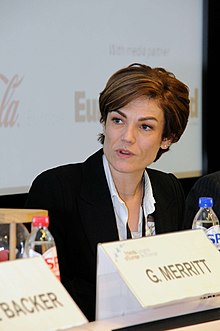Chantal Jouanno
Chantal Jouanno | |
|---|---|
 Chantal Jouanno in 2010 | |
| Member of the French Senate for Paris | |
| In office 1 October 2011 – 1 October 2017 | |
| French Minister of Sports | |
| In office 2010–2011 | |
| President | Nicolas Sarkozy |
| Prime Minister | François Fillon |
| Preceded by | Roselyne Bachelot |
| Succeeded by | David Douillet |
| Personal details | |
| Born | Chantal Paul 12 July 1969 Vernon, France |
| Political party | UDI |
| Spouse | Hervé Jouanno (m. 1996) |
| Alma mater | Sciences Po, ÉNA |
Chantal Jouanno (French pronunciation: [ʃɑ̃tal ʒwano]; née Paul; born 12 July 1969 in Vernon, Eure, France) is a French politician who served as Minister of Sports in the government of Prime Minister François Fillon from 14 November 2010 and 26 September 2011, succeeding to Roselyne Bachelot and being replaced by David Douillet, before taking office as senator on 1 October 2011. She was a close ally of president Sarkozy and former president of ADEME.
Martial arts practitioner
Jouanno is a former karate champion, being a twelve-time French champion in her category. On 7 March 2010, she became karate French Team Champion together with her teammates Véronique Mesnil De Vido and Léna Pyrée.[1]
Political career
Career in government, 2009–2011
From 21 January 2009 to 14 November 2010, Jouanno served as Minister for Ecology in the second government of François Fillon, succeeding Nathalie Kosciusko-Morizet.[2]
As Minister of Sports, Jouanno launched two inquiries with the French Football Federation (FFF) into allegations that the national team coach, Laurent Blanc, and others from the federation had discussed introducing racial quotas at training academies for young French players with dual nationality.[3]
In addition to her roles in national government, Jouanno served as regional councillor of Île-de-France from 2010 until 2017.
Member of the Senate, 2011–2017
In response to public outrage over a photo display in Vogue that featured under-age girls in sexy clothes and postures, Minister of Health Nora Berra commissioned Jouanno to write a report on the "hypersexualization" of children in 2011.[4]
During the 2012 Presidential election, Jouanno suggested if she had to choose between a Socialist candidate and a National Front one, she would vote Socialist. This comment was interpreted by Sarkozy supporters such as Francois Fillon as being critical of Sarkozy's attempts to woo National Front supporters.[5]
In October 2012, Jouanno announced leaving the UMP party to join the newly created centre-right party UDI, led by Jean-Louis Borloo, as vice-president. In 2013, Borloo included Jouanno in his shadow cabinet; in this capacity, she served as opposition counterpart to Minister of Foreign Affairs Laurent Fabius.[6]
In the Republicans' 2016 presidential primaries, Jouanno endorsed Nathalie Kosciusko-Morizet as the center-right parties' candidate for the 2017 French presidential election[7] but later switched to Alain Juppé.[8]
In 2017, Jouanno announced her intention to resign from active politics.[9]
Later career
In March 2018, Jouanno became President of the Commission nationale du débat public (CNDP). In January 2019, she announced that she was stepping down from one of her roles associated with this position due to compensation issues – that of guiding the national debate in response to the gilet jaunes movement.[10] This announcement came prior to the commencement on 15 January of the great national debate, which was initiated by Emmanuel Macron. As of January 2019, she received 14,666 euros a month in salary, almost equal to the president's salary.[11] Her mandate ended in 2023.[12]
References
- ^ Le Monde: Chantal Jouanno, French champion (in French)
- ^ "Liberation: Chantal Jouanno, new Secretary of State for Ecology (in French)". Archived from the original on 23 July 2013. Retrieved 11 April 2010.
- ^ Matthew Saltmarsh (10 May 2011), France Clears Soccer Coach of Racial Discrimination International Herald Tribune.
- ^ Alissa J. Rubin and Maïa de la Baume (18 September 2013), French Senate Approves Ban on Pageants for Young Girls The New York Times.
- ^ "Unease grows in Sarkozy party over rightward lurch". Reuters. 29 April 2012. Archived from the original on 24 September 2015. Retrieved 30 June 2017.
- ^ L'UDI de Borloo se dote d'un contre-gouvernement L'Express, 15 June 2013.
- ^ Primaire à droite : Nathalie Kosciusko-Morizet a réuni assez de parrainages Le Monde, 8 September 2016.
- ^ Marion Mourgue (2 November 2016), Chantal Jouanno: «Il est difficile pour moi de soutenir Nicolas Sarkozy» Le Figaro.
- ^ Chantal Jouanno (UDI) quitte la vie politique BFM TV, 6 July 2017.
- ^ Julie Carriat and Inti Landauro (8 January 2019), French official due to lead 'yellow vests' debate quits in pay furore Reuters.
- ^ Le Monde with AFP (8 January 2019). "" Gilets jaunes " : Chantal Jouanno se retire du pilotage du grand débat national". lemonde.fr. Retrieved 8 January 2019.
- ^ Rémi Barroux (20 March 2023), Chantal Jouanno : « La défiance est le problème principal de toutes les politiques publiques » Le Monde.
